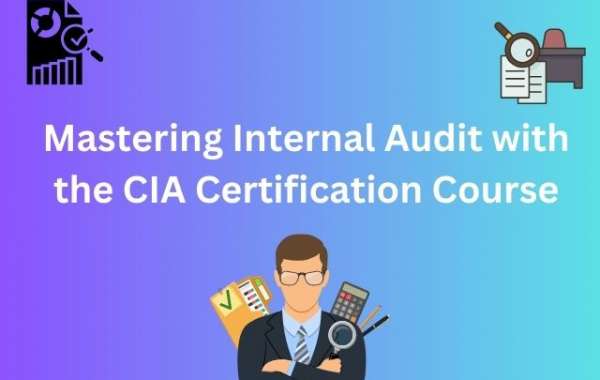In today’s fast-paced and ever-evolving business environment, the internal auditors role has become increasingly crucial. Companies of all sizes seek skilled professionals who can ensure that their operations run efficiently, comply with regulations, and manage risks effectively. Among the various qualifications available for internal auditors, the Certified Internal Auditor (CIA) certification stands out as a globally recognized credential that validates one's expertise in internal auditing. This blog explores the importance of the CIA certification, its structure, and how it can propel your career forward.
Why Pursue the CIA Certification?
The CIA certification, offered by The Institute of Internal Auditors (IIA), is the only globally recognized certification for internal auditors. Earning this certification demonstrates your commitment to the profession and your proficiency in internal audit practices. Here are some compelling reasons to consider pursuing the CIA certification:
Global Recognition: The CIA designation is recognized worldwide, making it easier for professionals to find opportunities across different countries and industries.
Career Advancement: CIA-certified professionals are often preferred for higher-level positions and leadership roles within organizations. The certification can open doors to a wide range of career opportunities.
Increased Earning Potential: According to various salary surveys, CIA-certified auditors tend to earn higher salaries compared to their non-certified peers. The certification signifies a higher level of expertise and commitment, which can translate into better compensation.
Enhanced Skills and Knowledge: The rigorous process of obtaining the CIA certification ensures that candidates have a deep understanding of internal audit principles, risk management, and governance. This knowledge is invaluable for performing audits effectively and adding value to the organization.
Structure of the CIA Certification Course
The CIA certification process involves passing a series of exams that test your knowledge and skills in internal auditing. The course is structured into three parts, each focusing on different aspects of the profession:
- Part 1: Essentials of Internal Auditing
- This part covers the basics of internal auditing, including the foundations of internal audit, independence and objectivity, and the proficiency and due professional care required in the profession. It also addresses governance, risk management, and control.
- Part 2: Practice of Internal Auditing
- The second part delves into the practice of internal auditing, emphasizing the importance of managing the internal audit function, planning engagements and performing the engagement. It also includes conducting engagements with various audit techniques and processes.
- Part 3: Business Knowledge for Internal Auditing
- The final part focuses on business acumen, covering topics such as information security, information technology, and financial management. It also includes an understanding of different business environments, organizational behaviour, and managerial processes.
Preparing for the CIA Exams
Successfully passing the CIA exams requires dedication, discipline, and a strategic study approach. You can contact the Academy of Internal Audit to help you prepare for CIA Exam. AIA is the best training Institute for CIA and an Authorized learning Partner of IIA India. AIA provides CIA prep Course for CIA Three part exam and also for CIA Challenge Exam. Here are some tips to help you prepare:
Understand the Exam Content: Familiarize yourself with the content outline for each part of the exam. The IIA provides a detailed syllabus that outlines the topics covered in each section.
Create a Study Plan: Develop a study plan that allows you to cover all the topics systematically. Allocate sufficient time for each part and stick to your schedule.
Utilize Study Materials: Invest in quality study materials, including CIA review courses, textbooks, and practice exams. The IIA offers a variety of resources to help candidates prepare effectively.
Join Study Groups: Consider joining a study group or an online forum where you can discuss topics, share resources, and get support from fellow candidates.
Practice with Mock Exams: Taking practice exams can help you get a feel for the actual exam format and identify areas where you need further study.
Stay Consistent: Consistency is key to success. Regular study sessions and continuous revision will help reinforce your knowledge and build confidence.
The Benefits of Being a CIA
Once you earn the CIA certification, you will join an elite group of internal audit professionals who are recognized for their expertise and commitment to the profession. Here are some of the benefits of CIA Certification:
Professional Credibility: The CIA designation adds credibility to your resume and can enhance your reputation within the industry.
Networking Opportunities: As a CIA, you gain access to a global network of internal audit professionals. This can lead to valuable connections, career opportunities, and professional growth.
Continual Learning: The IIA encourages CIAs to engage in continual professional education, ensuring that you stay current with industry trends and best practices.
Contributing to Organizational Success: With your enhanced skills and knowledge, you can make significant contributions to your organization’s success by improving its internal control systems, risk management processes, and overall governance.
In conclusion, the CIA certification is a powerful credential that can elevate your career in internal auditing. It provides global recognition, enhances your professional skills, and opens up numerous opportunities for career advancement. If you are committed to becoming a leader in the field of internal auditing, pursuing the CIA certification is a step in the right direction.




